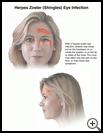
Herpes Zoster (Shingles) Eye Infections
________________________________________________________________________
KEY POINTS
- Herpes zoster, or shingles, is an infection caused by the same virus that causes chickenpox.
- You can get a vaccine to help prevent or lessen the symptoms of shingles. It cannot be used to treat shingles once you have it.
- Several medicines are helpful in treating herpes zoster eye infections.
________________________________________________________________________
What is a herpes zoster eye infection?
Herpes zoster is an infection caused by the same virus that causes chickenpox. Herpes zoster is also called shingles. You cannot have shingles unless you had chickenpox in the past.
Shingles causes painful blisters near nerves on one side of your body. It may spread to your face and eyes. The virus can cause severe damage to your eyes. Early diagnosis and treatment can help greatly in reducing serious complications from herpes zoster eye infections.
What is the cause?
If you have had chickenpox, you are at risk for later developing shingles. After you recover from chickenpox, the chickenpox virus stays in your body. The virus can become active again if your body's immune system is weakened by:
- Aging. Shingles is most common in people over 50 years old.
- Diseases such as AIDS or Hodgkin lymphoma
- Chemotherapy or radiation therapy
- Certain medicines, such as steroids
Your risk for getting shingles may be higher if you have recently:
- Been under a lot of stress
- Had a long-term problem with a poor diet
- Spent a lot of time in the sun
A person with shingles can transmit chickenpox to a person who has never been exposed to the chickenpox virus. The virus is spread by contact with the blisters. The blisters are no longer contagious after they dry up and form scabs.
What are the symptoms?
Symptoms of herpes zoster eye infections usually come in three phases:
- Early phase: Sharp, stabbing, itching or burning pain in the forehead, eyelids, or the tip or sides of the nose. You may also have fever, tiredness, chills and headache.
- Break out phase: About 3 to 5 days after the symptoms of the early phase start, blisters may break out on the forehead, on or inside the eyelids, or on the tip or sides of the nose. The blisters start out clear with redness around the base of the blisters. Over 5 to 7 days the clear blisters turn to pus or start to bleed. The virus may affect only the skin on the face, or may cause eye symptoms such as:
- Swollen eyelids
- Red, painful, watery eyes
- Sensitivity to light
- Blurry vision
- Feeling like you have something in your eye or under the eyelid
Some people have only eye symptoms and no blisters.
- Recovery phase: The blisters start to crust over and heal in 1 to 3 weeks and the pain or irritation usually goes away in 3 to 5 weeks. If the virus damages a nerve, you may have pain, numbness, or tingling for months or even years after the rash is healed.
How is it diagnosed?
Your healthcare provider will ask about your medical history and symptoms and examine your skin and eyes. Fluid from the blisters may be sent to a lab to check for the virus. A dye may be put on the surface of your eye to make it easier to see if there is damage to your eye from the infection.
How is it treated?
Several medicines are helpful in treating herpes zoster eye infections. Your healthcare provider may prescribe:
- Antiviral eye drops, ointments, or pills to help treat the infection
- Steroid medicine to lessen pain and reduce inflammation
- Pain medicine to treat pain in your nerves
How can I take care of myself?
Follow the full course of treatment your healthcare provider prescribes. Ask your healthcare provider:
- How and when you will get your test results
- How long it will take to recover
- If there are activities you should avoid and when you can return to your normal activities
- How to take care of yourself at home
- What symptoms or problems you should watch for and what to do if you have them
Make sure you know when you should come back for a checkup. Keep all appointments for provider visits or tests.
What can I do to help prevent herpes zoster eye infections?
Most children now get shots to prevent infection with the chickenpox virus. If you have never had chickenpox, you can get a shot to help prevent infection with the virus. A shingles vaccine is available for people 50 years of age and older. It is recommended for people 60 years of age and older. The vaccine can help prevent or lessen the symptoms of shingles. It cannot be used to treat shingles once you have it.
If you have not been vaccinated and have never had chickenpox, try to avoid contact with people who may have an active chickenpox infection. If you are pregnant, you should not be around someone with chickenpox or shingles.

